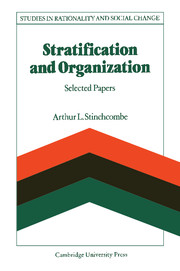Book contents
- Frontmatter
- Contents
- Acknowledgments
- 1 Rationality and social structure: an introduction
- PART I STRATIFICATION
- PART II ORGANIZATIONS
- 9 Bureaucratic and craft administration of production: a comparative study
- 10 Social structure and the founding of organizations
- 11 On social factors in administrative organization
- 12 Norms of exchange
- PART III SOCIOLOGY AS A PROFESSION
- Bibliography
- Name and place-name index
- Subject index
12 - Norms of exchange
from PART II - ORGANIZATIONS
Published online by Cambridge University Press: 06 July 2010
- Frontmatter
- Contents
- Acknowledgments
- 1 Rationality and social structure: an introduction
- PART I STRATIFICATION
- PART II ORGANIZATIONS
- 9 Bureaucratic and craft administration of production: a comparative study
- 10 Social structure and the founding of organizations
- 11 On social factors in administrative organization
- 12 Norms of exchange
- PART III SOCIOLOGY AS A PROFESSION
- Bibliography
- Name and place-name index
- Subject index
Summary
A basic typology of exchange relations
People enter into exchanges in modern economies to get what they want. Consequently norms about exchanges are mainly norms to see to it that they get what they want. To analyze the variations in exchange norms, then, we have to start with a typology of what people want in exchanges. I propose that the main dimensions of wants that affect the norms of exchanges are continuity of exchange (continuous to intermittent), productive purpose (from satisfaction directly from the object or service exchanged to use of the object or service in a productive system), and conditionality or adaptiveness (from wanting something unconditionally to wanting it under some conditions, which in turn may be ‘on demand’ – e.g. wanting the money in one's checking account (i.e. current account) – or specified – e.g. on the death of the insured).
For example, the subcontracting system in the construction industry is in part designed to handle the variability in the wish to exchange by a general contractor, caused by variations in the work flow he must handle. Rather than hiring a crew of painters permanently, he exchanges when convenient. But the exchange, like a permanent hiring exchange, is for the purpose of incorporating them into a productive system, the site crew for a building, and so involves specifying technical standards and scheduling constraints. The exchange is unconditional, in the sense that when the contract is signed the general contractor knows he wants the building painted, except for acts of God or riot.
- Type
- Chapter
- Information
- Stratification and OrganizationSelected Papers, pp. 231 - 268Publisher: Cambridge University PressPrint publication year: 1986
- 16
- Cited by

